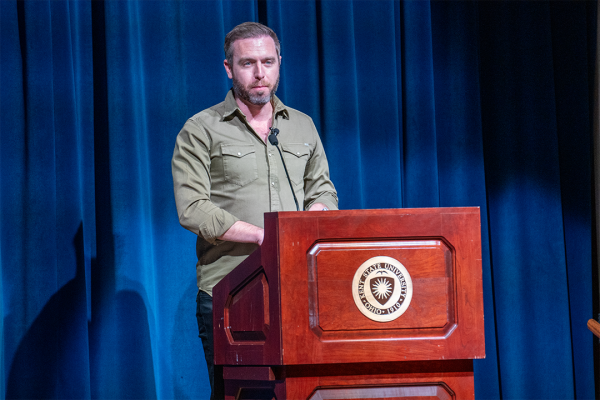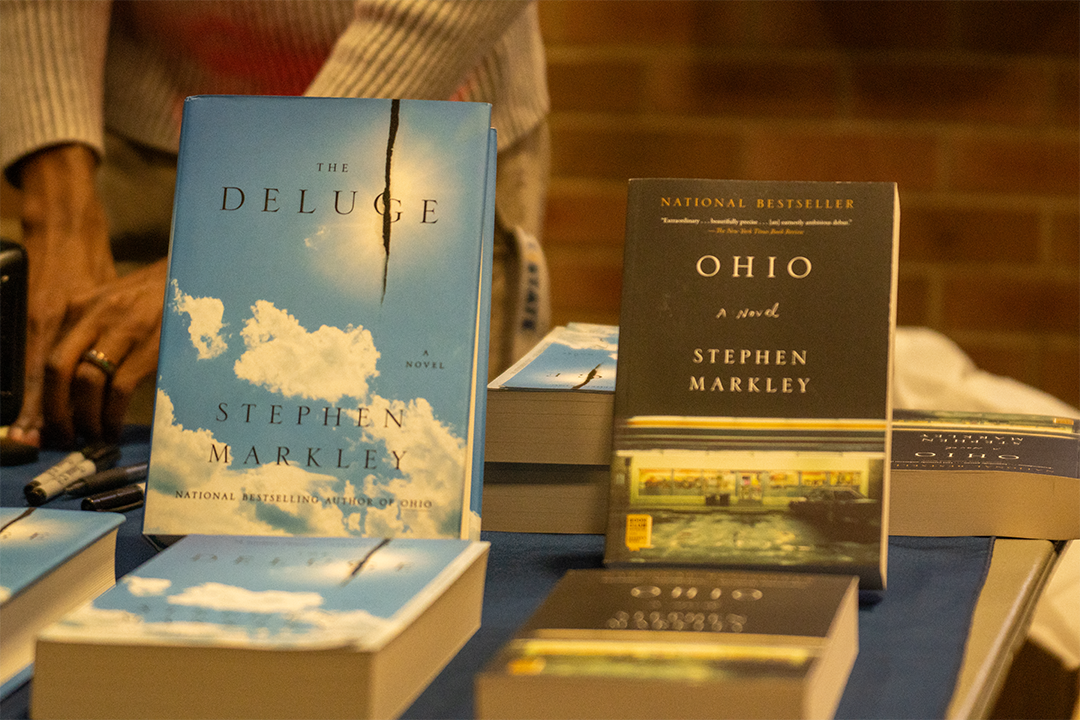Stephen Markley, author, spoke to students and faculty about issues resulting from climate change during a discussion focused on his recent book, “The Deluge.”
“The Deluge” follows Tony Pietrus, a scientist who studies deposits of undersea methane, when he receives a death threat. This causes him to assemble an ensemble of individuals ranging from a drug addict to a young activist, Kate Morris, who joins in his journey across America.
Throughout the course of the story, each character is faced with the question, “How much are they willing to sacrifice to save humanity’s future?”
Michael Byron, professor and chair of the philosophy department, said the event was supported by the Kent State University Inaugural Brockett Lecture and the Veroni Memorial Lectures in Philosophy and the Humanities.
The department of philosophy mainly supported the event with additional support from the departments of anthropology, earth sciences, English and history, Byron said.
The event started with Markley reading an excerpt from his book in which the character Kate Morris speaks to a crowd about the atmosphere’s carbon dioxide level and joining the climate change movement.

“‘I promise you this, if you do not join this movement now, you will wake up 10, 15, 20 years from now and feel sick that you didn’t do everything you could during the sliver of time when we still had a chance,’” Markley said.
When Markley finished reading the excerpt, David Pereplyotchik and Deborah Barnbaum, associate philosophy professors, interviewed Markley about his book.
Barnbaum asked Markley what led him to write his book and Markley said he realized the importance of climate change after he read other books centered around it.
“When I really started to read books about it and understand it, not just in the abstract but in its individual granular detail,” Markley said, “I was suddenly like, ‘Holy shit this is actually a huge deal.’”
Markley said he had to change aspects of his book as he initially started writing it in 2010. Since then a number of events that nearly occurred in his book have occurred in real life.
“Part of the process of writing was that I’d come up with this terrifying scenario and year by year that scenario would just happen in the real world,” Markley said. “Whether that was a sort of the rise of a more reactionary, authoritarian politics.”
Markley said he had to modify the high temperatures Americans faced in his book because of Canada’s wildfires. Pereplyotchik then asked him what other situations could arise from climate change.
“Scariest parts are food production, I think that’s incredibly concerning just because all of human civilization has arisen during a pretty tame set of atmospheric conditions,” Markley said.
Markley said changes in the climate will have effects on agriculture and will cause the sea level to rise.
“It’s hard to grasp why 6 feet of sea level rise by 2100 is so scary, but it’s really scary because…, most of the human population lives on the coast,” Markley said. “If it’s not tenable, if it’s not insurable, our entire economic system starts to wobble.”
With the discussion of the effects of climate change, Barnbaum asked Markley whether he thinks the situation has to become worse for people to become proactive.
“The propaganda war has been waged by the fossil fuel industry to convince people this isn’t real,” Markley said.
Even though fossil fuel companies are attempting to persuade people, conditions do not have to worsen before people realize the effects, as there are people attempting to enact change now, Markley said.
“There are a lot of smart, dedicated people who are taking every signal facet you can even imagine of this crisis very seriously and dedicated their lives and careers to it,” Markey said. “That was something that in the process of writing the book really heartened me.”
Adriana Gasiewski is a staff reporter. Contact her at [email protected].




